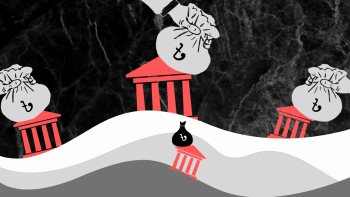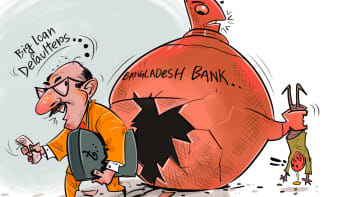Big loan defaulters are not above the law

It is increasingly evident that Bangladesh has become somewhat of a haven for loan defaulters – those of the wilful type, of course – as they continue to exploit loopholes in our poorly-regulated banking sector. These defaulters as well as money launderers draw their strength from the same source, and are often the same people, as an economist recently reminded us. Yet, defaulting on a dubiously approved loan or getting it frequently rescheduled, never to be repaid in many cases, is somehow not as big a crime as the other category. On the contrary, rules continue to be relaxed to make this happen. Against this backdrop, the High Court on Sunday blasted the Anti-Corruption Commission (ACC) for dilly-dallying in bringing major loan defaulters and embezzlers to book.
The court's warning in this regard is nothing new, nor is it for the ACC to be at the receiving end of such warnings, which it happily disregards anyway. This time, however, it achieved additional significance because of a recent disclosure about a PK Halder-style scam, in which Tk 9,500 crore was alleged to have been embezzled from three Islamic banking institutions by a politically well-connected coterie, raising fears of the money being laundered. The news comes amid concerns over a "taka crisis" in the banking sector following the dollar crisis that has rocked the country in recent months.
The High Court, during a hearing on an embezzlement case involving another Islamic bank, left a series of questions for both the ACC and the higher authorities: Why are you not taking effective actions against the major loan defaulters? Are they above justice? Will they remain untouched? Earlier, on November 8, the same HC bench, while reprimanding the ACC for the long delay in investigating the BASIC Bank scams, asked: Why has the bank's former chairman Sheikh Abdul Hye Bacchu not been implicated in any of the cases? Why has no charge sheet been submitted even after seven years? Will the investigation continue for an indefinite period?
It is heartening that the court is asking the same questions that citizens are, but it is tragic that it also seems to be as helpless as citizens are, asking questions when it should be in a position to give judgements. This is alarming, to say the least. It shows the total lack of unaccountability not just in the financial sector but also institutions like the ACC and police that the judiciary relies upon for successful trials.
Such financial irregularities are chief among factors responsible for the present economic turmoil. As of September 2022, the amount of non-performing loans (NPLs) stands at a staggering Tk 134,396 crore – 9.36 percent of our total outstanding loans. For state-owned commercial banks, it is 23.04 percent of their own outstanding loans. Lack of good governance and accountability are clearly enabling powerful defaulters to get away without repayment. This has to change. This must change if we are to get out of the present turmoil. The authorities must tighten financial regulations and stop pandering to the politically connected business entities and individuals. These swindlers must be brought to justice.


 For all latest news, follow The Daily Star's Google News channel.
For all latest news, follow The Daily Star's Google News channel. 








Comments